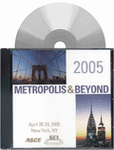A Methodology to Evaluate Robustness in Steel Buildings — Surviving Extreme Fires or Terrorist Attack Using a Robustness Index
Publication: Structures Congress 2005: Metropolis and Beyond
Abstract
Recent events have shown that traditional design methods have not always provided sufficient protection against catastrophic failure when buildings are subjected to extreme events of an unpredictable nature. Hazards such as terrorist attack or accidental explosion followed by fire are difficult to deal with using the standard engineering methodology of designing structural capacity to match calculated loading. For one thing, catastrophic loading is virtually impossible to quantify due to its random and unpredictable nature. And even if such loading could be defined, the capacity vs. demand method would probably lead to structures too expensive to build. A design methodology is presented here that divides the structural design process into three phases based on three fundamental types of loading. The first level of loading consists of the "known" loads, such as those specified in building codes and those that can be accurately defined by engineering judgment. Structural design for these types of loads follows the usual demand vs. capacity methods. The second level of loading consists of the "knowable" loads, which can be visualized and quantified to some degree, such as earthquake loading or traditional fire exposures. Performance-based methods to design for these types of loading have been highly developed in recent years and have been very effective. The third level of loading consists of the "unknowable" loads, which are the catastrophic events that cannot be predicted or perhaps even envisioned before they actually occur. The most feasible way to protect a building from collapse due to a particular event of this type is to increase the overall robustness of the structure — its ability to survive all types of extreme loading. This paper offers a methodology to rationalize and quantify the third level of this approach — designing for unknowable loads. Characteristics of structures which contribute to robustness are identified and discussed. The concept of a robustness index to quantify structural robustness is introduced. Additionally, the application of such an index to evaluating robustness of new and existing buildings is discussed.
Get full access to this article
View all available purchase options and get full access to this chapter.
Information & Authors
Information
Published In
Copyright
© 2005 American Society of Civil Engineers.
History
Published online: Apr 26, 2012
ASCE Technical Topics:
- Building design
- Continuum mechanics
- Design (by type)
- Disaster risk management
- Disasters and hazards
- Dynamic loads
- Dynamics (solid mechanics)
- Engineering fundamentals
- Engineering materials (by type)
- Engineering mechanics
- Fires
- Load factors
- Man-made disasters
- Materials engineering
- Metals (material)
- Seismic loads
- Solid mechanics
- Steel
- Steel structures
- Structural design
- Structural dynamics
- Structural engineering
- Structures (by type)
- Terrorism
Authors
Metrics & Citations
Metrics
Citations
Download citation
If you have the appropriate software installed, you can download article citation data to the citation manager of your choice. Simply select your manager software from the list below and click Download.
